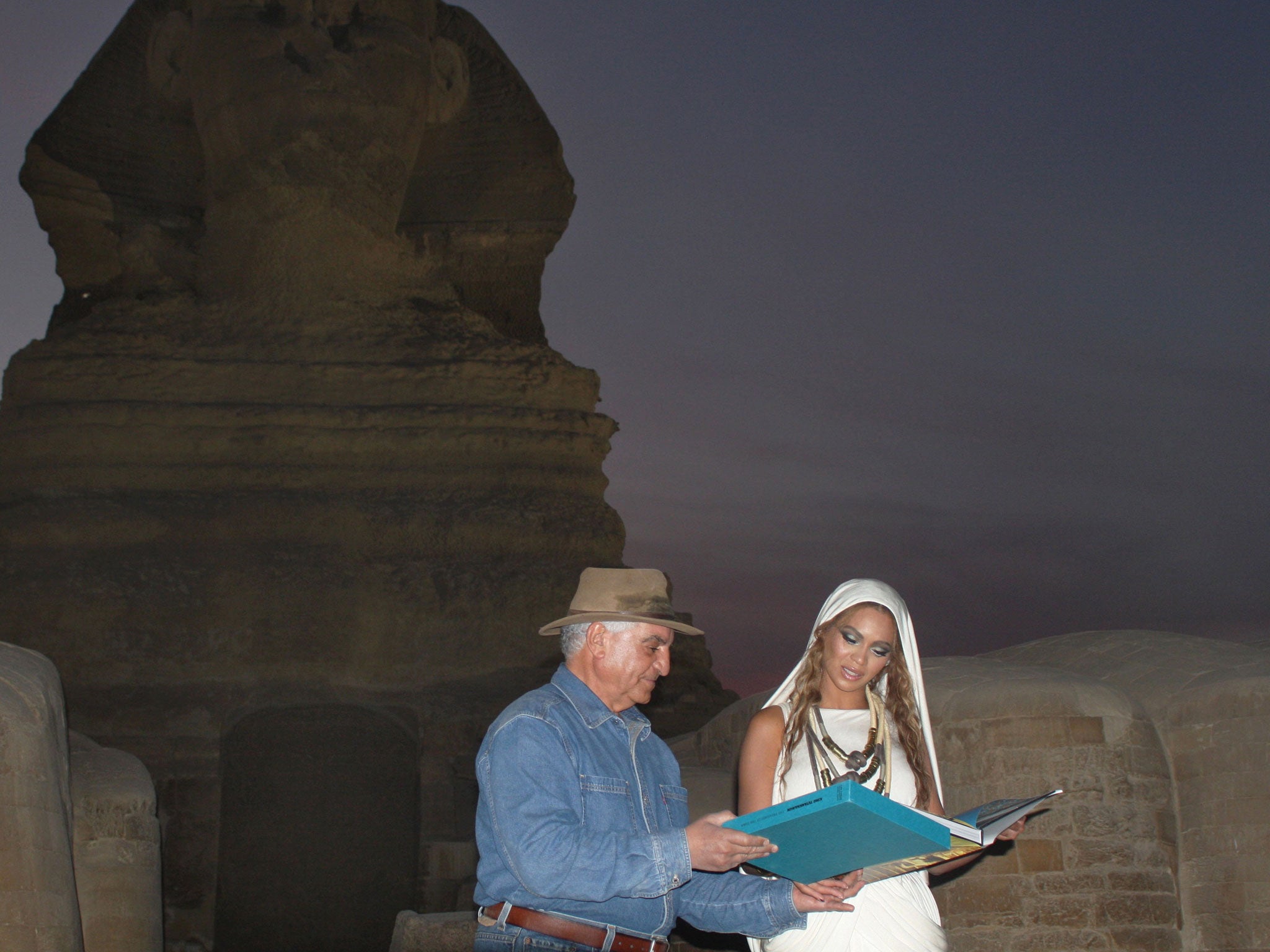'Rude' Beyoncé banned from Pyramids by 'Egypt's Indiana Jones'
The controversial archaeologist Zahi Hawass reveals how her lateness led to upset

No-one keeps Zahi Hawass, the controversial archaeologist described as Egypt's Indiana Jones, waiting. Not even Beyoncé.
Dr Hawass, Egypt's former head of antiquities and gatekeeper of the Pyramids, banished Beyoncé from the ancient site after he was sickened by what he described as the star's rudeness.
"Most people I take on tours are very nice and we become friends. But this lady…," begins Hawass, the former Minister of State for Antiquities, who lost his post during the 2011 protests and is at the centre of corruption allegations over his work for National Geographic.
"She said she would come at 3pm but she came late. I said 'You have to say I'm sorry I'm late'. But she didn't open her mouth," continued Dr Hawass, credited with modernising the management of Egypt's ancient sites and who claims to have repatriated 6,000 artefacts "stolen" by Western powers.
"I brought a photographer and she also had a photographer and a guard. When my photographer started to shoot, he said 'No, Stop! I am the one who says yes or no, not you.' I said 'In that case since you almost hit my photographer and you are not polite - out! I am not giving you the privilege of having you on my tour.' I said Beyoncé was stupid and I left."
Dr Hawass, 66, visiting London to present his latest DNA examination of the pharaohs in a book, Discovering Tutankhamun, admits he has made enemies. "People attack me because I am famous. When I took President Obama to Giza, the camel driver recognised me and he asked 'But who is the friend of Hawass?' When I gave a lecture at your Dome of the Millennium 1,700 came to hear me. Bill Clinton got 700."
Protesters denounced Dr Hawass as "the Mubarak of Antiquities" and accused him of corruption. The US Justice Department reportedly launched an investigation into his $200,000 role as National Geographic's Explorer-in-Residence, which helped secure the Washington-based organisation favourable access to the pyramids and Tutankhamun treasures.
"There were 20 accusations made against me but they were all dropped," the Egyptologist said. "They accused me of sleeping with prostitutes which I have never done. No-one can ever bribe me because I am a man of dignity and honour. Every contract was legal. National Geographic benefited more than me."
Famed for his fedora and natty excavation wear, Dr Hawass did launch his own fashion range, offering rugged khakis and leather jackets. But the profits went to the Children's Cancer Hospital in Cairo.
The on-going ferment which has seen the Muslim Brotherhood swept away to be replaced by a new military council has placed Egypt's antiquities at risk. Vital tourism revenues have been lost. So Dr Hawass is poised to make a shock return. "Already 20,000 signatures have been collected for me to come back. Even those who were against me say they need me back," he argued.
"For a period there was looting everywhere and illegal excavations. So from Sunday I have agreed to travel all over the world on behalf of the Ministry of Tourism to tell people that the sites are now completely secured. Egypt is safe for everyone and we need tourists to come back."
He continues to plead for the return of the Rosetta Stone, the linguistic key to deciphering hieroglyphics, from the display rooms of the British Museum, where it has been on show since 1802. "It is an icon of Egyptian identity and one day it should go back. I proposed we should give the Museum something in return."
There are still more treasures for Dr Hawass to discover. "I still believe there is a secret burial chamber, containing treasure inside the Great Pyramid built by Pharoah Cheops. I hope to reveal the last great secret of the Pyramid with an English team."
The authority on all Pharoah matters dismisses a recent television investigation which claimed that the boy king Tutankhamum died after being injured in a chariot race. "He was a disabled boy. He was sick, he could not drive a chariot. I examined the bones in the Mummy and there is no evidence for this."
Dr Hawass predicts that Egyptian army chief Gen Abdel Fattah al-Sisi, who led the July overthrow of President Mohamed Morsi, will stand for the Presidency and reinstate the "strong man" leadership Egypt enjoyed during the pyramid-building era 4,200 years ago. His own exile looks likely to end soon - but the feuds may not.
Dr Hawass remains unapologetic after "banning" Joann Fletcher, the York Egyptologist who presented a BBC series on life and death in the Valley of the Kings. "She came on an expedition and claimed to have found the mummy of Queen Nefertiti. But she broke the rules by making a Discovery Channel show instead of writing first to the Supreme Council of Antiquities. So she cannot work here. And this mummy was nothing to do with Nefertiti."
Join our commenting forum
Join thought-provoking conversations, follow other Independent readers and see their replies
0Comments